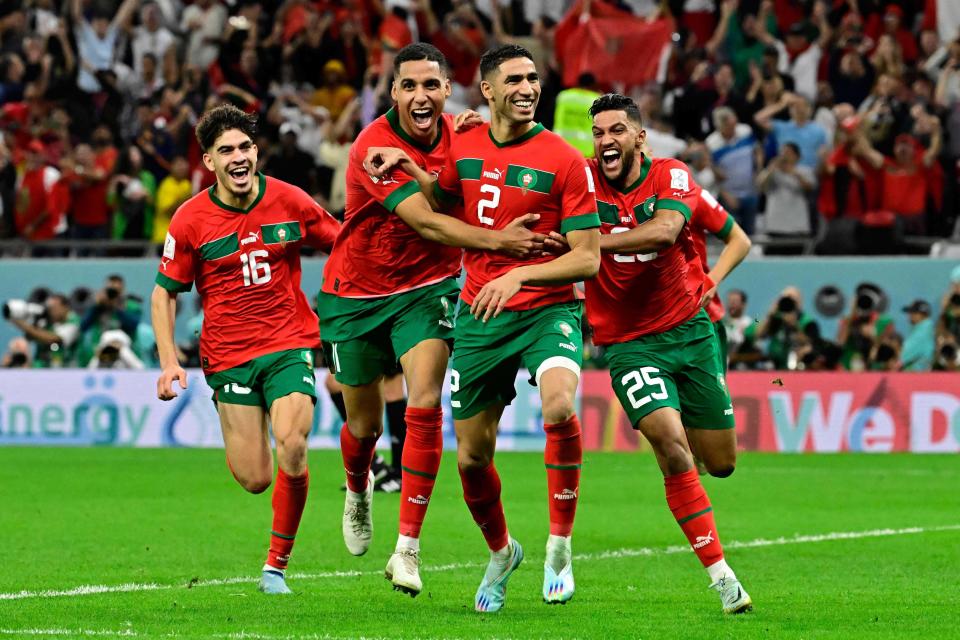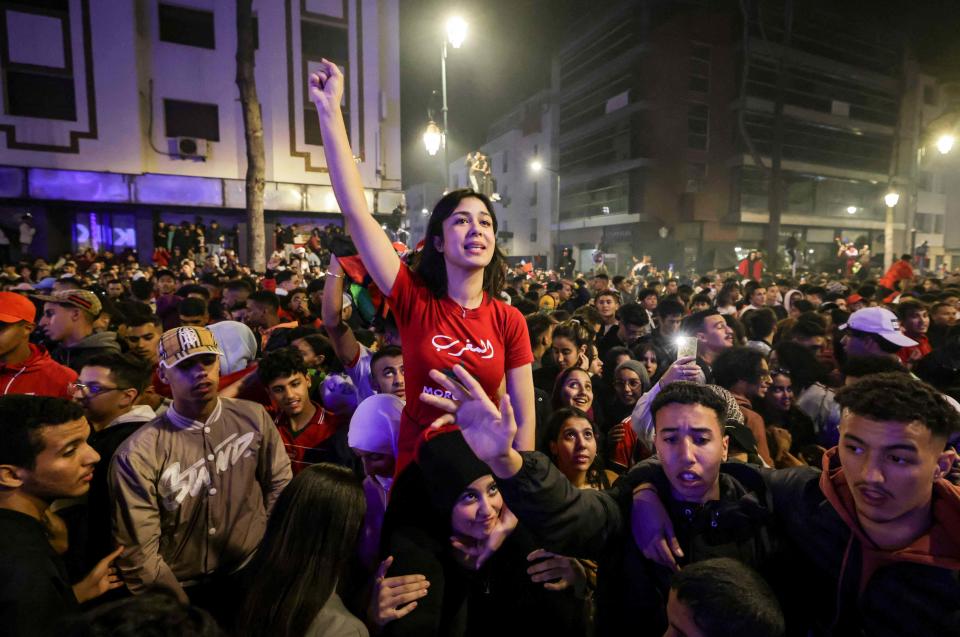How Morocco's surprise World Cup run rallied a legion of Arab fans
DOHA, Qatar — When Morocco takes the field Saturday for the World Cup’s quarter final, the team will have not just an entire nation behind them, but a legion of fans throughout the Arab world.
The underdog Atlas Lions, as the team is known, has enjoyed surprising success and become emblematic of this year’s tournament, the first to be held in an Arab or Muslim-majority country.
Raucous supporters from nearby countries have packed stadiums and fan parks in Qatar to cheer, dance and sing as first Saudi Arabia and then Tunisia and Morocco upset higher-ranked teams.

Morocco is now the last of those left standing and is hoping to beat star-studded Portugal at 10 a.m. ET Saturday to become the first African nation to ever make the semifinals of the men’s soccer tournament.
They knocked out favorite Spain on penalty kicks earlier in the week, an emotional victory that sparked jubilant celebrations from fans at home in Morocco, in Qatar and on the streets of cities across Europe.
For many, the chance to rally behind Morocco offers an opportunity to display regional unity and bring more visibility to some of its causes.
Borhen Bibo, from fellow north African country Tunisia, will be watching and rooting for Morocco.
“We are supporting all the Arabian teams,” he said to NBC News while having coffee and shisha in the crowded old market Souq Waqif, located in the heart of Doha. “We are cooperating since a long time and do have many things in common, like language, like religion.”
Soccer enthusiasts like Bibo from across the Arab world flooded a FIFA Fan Zone — sites where people can drink alcohol in the mostly dry country and watch the games on big screens — for the match against Spain on Tuesday night.
They were energized by Morocco’s huge upset, erupting into cheers when young defender Achraf Hakimi impudently converted the decisive penalty. Hakimi, born in the Madrid suburbs to Moroccan parents and eligible to represent either country, is a fitting star for a team that has helped bring an outpouring of pride in Arab identity from fans who may otherwise feel separated by geopolitical tensions or generational divides.
“It was really awesome to be in the atmosphere. The fans were very noisy and super happy,” Mohammed Al-dubaisi, a Moroccan fan, told NBC News from the Fan Zone that night. “It was very awesome and proud,” he said.
The excitement for Morocco’s progression in the tournament was felt around the world.

Fans in France, England and even Spain spilled into the streets to rejoice, some lighting fireworks.
Teams from the African and Asian continents are less represented at the World Cup than those from the Americas and Europe. Like in 2010, when people from Africa were rooting for the underdog Ghana, Danyel Reiche, a visiting associate professor at Georgetown University in Qatar, said fans from those continents will rally behind the region’s leading team.
And because Qatar is the first Middle Eastern country to host the world’s most popular sporting event, Doha, the country’s capital, has become a hub for ethnic Arab fans to revel in Morocco’s success. Fans from the region of the world are well-represented at the games because of Qatar’s location in the Middle East, which helps Doha feel like home turf.
“What we’re witnessing now is a revitalization of pan-Arabism,” said Reiche, referring to the ideology describing a cultural and political unity among Arab nations which gained prominence in the mid-20th century.
Reiche, who co-authored the book “Qatar and the 2022 FIFA World Cup: Politics, Controversy, Change,” said it’s a “remarkable” development considering the history of tensions in the Arab world.
He pointed to the four countries in the region, Saudi Arabia, Bahrain, UAE and Egypt, that had a blockade against Qatar from 2017 until 2021. The quartet accused Doha of supporting extremist groups in the region, including the Muslim Brotherhood, a charge it denies, and pointed to Qatar’s close relations with regional foe, Iran.
Politics has not been absent from this Arab unity in Qatar, however.
The Moroccan team and their global fanbase are using their platform on the pitch and in the stands to show solidarity with those fighting for Palestinian people.
After their historic win, the Moroccan team posed with a Palestinian flag.
“There is a lot of solidary with the Palestinian cause,” said Reiche.
This article was originally published on NBCNews.com

